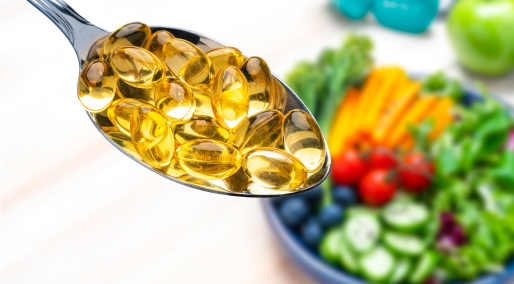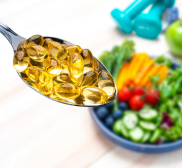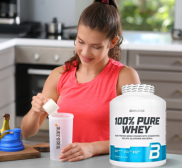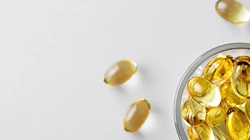.webp)
.webp)

Patryk Chodyniecki
Medicine for concentration
Nootropik to naturalny suplement diety lub lek, który ma korzystny wpływ na funkcjonowanie mózgu u zdrowych ludzi. Wiele z nich może działać na pamięć i koncentrację, sprawność umysłową i ogólne prawidłowe funkcjonowanie układu nerwowego. Możesz skorzystać z suplementu na pamięć i koncentrację, jeśli chcesz być bardziej skoncentrowany we wszystkich obszarach swojego życia.
A nootropic is a natural dietary supplement or drug that has a beneficial effect on brain function in healthy people. Many of them may affect memory and concentration, mental performance and the overall proper functioning of the nervous system. You can use a memory and concentration supplement if you want to be more focused in all areas of your life.
Why is it worth using a dietary supplement for memory and concentration?
These types of dietary supplements are useful during increased mental effort, for general improvement of memory, or to prevent the inhibition of platelet aggregation. It is recommended to take these types of products for specific hobbies, mental work, activities or less obvious moments such as driving a car, lifting weights or running around the yard with children. Being focused means feeling energized in both your mind and body, but it also means feeling motivated, uplifted, and ready to start your day. Omega acids, vitamin C, vitamin E, pantothenic acid, ginseng - these are just a few products that are worth using for the proper functioning of the nervous system. Let's take a look at all the recommended products!
B vitamins
The B vitamin family includes folic acid (vitamin B9), vitamin B12, vitamin B6, and vitamin B3 (niacin), and based on current research, these may be the best vitamins. A set of B vitamins certainly improves concentration. There is quite a lot of research on the use of B vitamins to improve overall cognitive function. B vitamins generally support healthy brain function, but no research has shown that B vitamins can reverse any disease states, such as Alzheimer's disease or other dementias. Let's look at the research on B vitamins for concentration and focus, specifically, a little closer.
Can B vitamins improve concentration?
Research generally confirms that B vitamins are a preparation intended to improve general cognitive ability, attention and blood supply to the brain. In both healthy adults and those with inadequate nutrition, a high dose of B-complex improves energy levels and mental performance. Cognition and episodic memory improved in adults and in people with mild cognitive impairment with B vitamins. In another study, folic acid (vitamin B9) with other B vitamins and folic acid alone improved cognition, especially memory, in people with mild cognitive impairment. There have also been some promising studies in children regarding B vitamins and improving attention. Vitamin B12 has been shown to improve their performance, and one study found that 8-year-old children whose mothers took methylated folate (B9) during pregnancy performed better on attention tasks. Research shows that B vitamins can help with attention and concentration. Part of the reason they may help with cognition is because they can reduce inflammation and oxidative stress and support healthy neural function.
Vitamin C
Vitamin C has been proven to be helpful for cognitive function in general and for improving attention in particular. One study found that taking vitamin C for five to 10 years could benefit overall cognitive function in elderly people. Additionally, adults with low vitamin C levels who took vitamin C were more motivated at work and had better attention span and performance.
Vitamin D
There is evidence that vitamin D may help improve attention, but not overall cognition, in older adults with MCI (mild cognitive impairment). However, vitamin D has not been shown to reduce inattention in children with attention-deficit/hyperactivity disorder (ADHD). Vitamins C and D are good for our health in many ways, not least including brain health. Both are important in supporting the immune system and our overall well-being. It is safe to take both vitamin C and vitamin D3 at the recommended daily doses. The best form of vitamin D, however, is that the body produces it itself, and we need about 20 minutes of sun exposure a day to get good levels of vitamin D. If you live in an area where you can't go outside every day and expose your arms and face to light, it is worth taking supplements.
Fish oils
Fish oil supplements are a rich source of docosahexaenoic acid (DHA) and eicosapentaenoic acid (EPA), two types of omega-3 fatty acids. These fatty acids have been linked to many health benefits, including improved brain health. DHA plays a vital role in maintaining the structure and function of your brain by supporting brain microcirculation. In fact, it makes up about 25% of total fat and 90% of the omega-3 fat found in brain cells. Another omega-3 fatty acid in fish oil, EPA, has anti-inflammatory effects that may protect the brain against damage and aging. Taking DHA supplements has been linked to improvements in thinking ability, memory and reaction time in healthy people who have low DHA intake. It also benefited people experiencing mild decline in brain function. Unlike DHA, EPA is not always associated with improved brain function. However, in people with depression, it has been found with benefits such as mood improvement. Taking fish oil, which contains both of these fats, has been shown to help reduce the decline in brain function associated with aging. The best way to get the recommended amount of omega-3 fatty acids is to eat two servings of oily fish per week. If you can't deal with it, taking a supplement will solve the problem.
Resveratrol
Resveratrol is a mental health product and an antioxidant that occurs naturally in the skin of purple and red fruits such as grapes, raspberries and blueberries. It can also be found in red wine, chocolate and peanuts. It has been shown that taking resveratrol supplements can prevent the deterioration of the hippocampus, an important part of the brain related to memory. Animal studies have also shown that resveratrol can improve memory and brain function. Additionally, one study in a small group of healthy older adults found that taking 200 mg of resveratrol daily for 26 weeks improved memory.
Creatine
Creatine is a natural substance that plays an important role in energy metabolism. It occurs naturally in the body, mainly in the muscles and in smaller amounts in the brain. Although it is a popular supplement, it can be found in some foods, namely animal products such as meat, fish and eggs. Interestingly, creatine supplements can improve memory and thinking skills in people who do not eat meat.
Caffeine
Caffeine is a natural stimulant, most commonly found in tea, coffee and dark chocolate. Although it can be taken in supplement form, there is really no need to do so when you can get it from these natural sources. It works by stimulating your brain and central nervous system, making you feel less tired and more alert. In fact, studies have shown that caffeine can make you feel more energized and improve your memory, reaction time, and overall brain function. The amount of caffeine in one cup of coffee varies, but is generally 50-400 mg. For most people, single doses of about 200-400 mg daily are generally considered safe and are sufficient for health benefits. However, taking too much caffeine can be counterproductive and has been linked to side effects such as anxiety, nausea and sleep problems.
Phosphatidylserine
Phosphatidylserine is a type of fatty compound called a phospholipid that can be found in your brain. It has been proven that taking phosphatidylserine supplements can be helpful in maintaining brain health. You can easily buy these supplements online. Studies have shown that taking 100 mg of phosphatidylserine three times daily may help reduce age-related decline in brain function. Additionally, healthy people who take phosphatidylserine supplements up to 400 mg daily have been shown to have improved thinking and memory.
Acetyl-L-Carnitine
Acetyl-L-carnitine is an amino acid produced naturally in your body. It plays an important role in metabolism, especially in energy production. Taking acetyl-L-carnitine supplements has been claimed to make you feel more alert, improve memory, and slow age-related memory loss. These supplements can be found at vitamin stores or online. Some animal studies have shown that acetyl-L-carnitine supplements can prevent age-related decline in brain function and increase learning ability. In humans, research has shown that it may be a useful supplement for slowing the decline of brain function due to age. It may also be useful for improving brain function in people with mild dementia or Alzheimer's disease. However, there is no research showing its beneficial effects in otherwise healthy people who do not suffer from loss of brain function.
Ginkgo Biloba
Ginkgo biloba is a herbal supplement derived from the Ginkgo biloba tree. It is an extremely popular supplement that many people take to increase brain power and efficiency. It is thought to work by increasing blood flow to the brain, resulting in better cerebral circulation. Thanks to this, the product improves brain functions such as concentration and memory. Some studies have shown that taking ginkgo biloba supplements may help reduce age-related decline in brain function.
Bacopa Monnieri
Bacopa monnieri is a medicine made from the herb Bacopa Monnieri. It is used in traditional medical practices such as Ayurveda to improve brain function. It has been shown to improve thinking skills and memory, both in healthy people and in older people suffering from declining brain function. However, it is worth noting that only repeated use of Bacopa monnieri showed this effect. People typically take about 300 mg daily, and it may take about four to six weeks to notice any results. Research on Bacopa monnieri also shows that this supplement may occasionally cause diarrhea and stomach upset. For this reason, many people recommend taking this product with food.
Rhodiola Rosea
Rhodiola rosea is a supplement derived from the herb Rhodiola rosea, which is often used in Chinese medicine to support well-being and healthy brain function. It is believed that the product can improve mental processing by reducing fatigue. People taking Rhodiola rosea have been shown to benefit from reduced fatigue and improved brain function.
S-Adenosyl Methionine
S-Adenosylmethionine (SAMe) is a substance that occurs naturally in your body. It is used in chemical reactions to create and break down important compounds such as proteins, fats and hormones. It may be useful for enhancing the effects of some antidepressants and reducing the decline in brain function seen in people suffering from depression. Studies show that adding SAMe to antidepressants prescribed to people who were previously unresponsive to therapy increased their chance of remission by approximately 14%.
Summary
It is worth following and implementing an appropriate diet and vitamins into your daily diet. They have a positive effect on brain function or in Alzheimer's disease. Vitamin deficiency may worsen memory processes. Their proper implementation improves the functioning of our nerve cells. For these reasons, it is worth using supplements that will support our nervous system.
https://drruscio.com/vitamins-for-concentration/
https://pl.iherb.com/blog/supplements-for-focus/1447
https://medium.com/personal-growth-lab/5-vitamins-minerals-to-boost-your-focus-concentration-and-productivity-45db8de37a
https://www.healthline.com/nutrition/vitamins-for-brain-fog
Rate the text

Patryk Chodyniecki

























